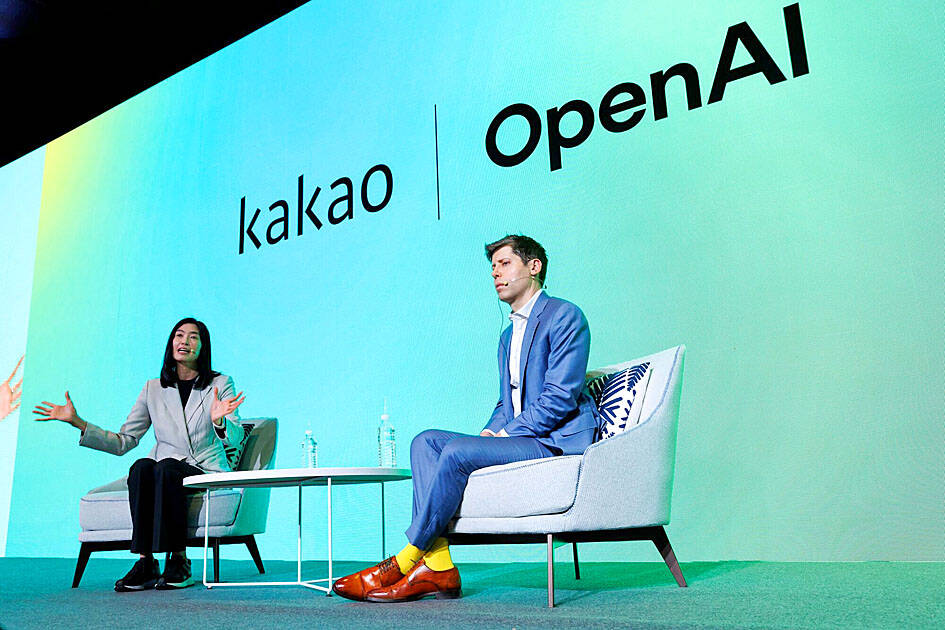OpenAI yesterday said it would develop artificial intelligence (AI) products for South Korea with chat app operator Kakao Corp, unveiling a second major alliance with a high-profile Asian partner this week.
In a whirlwind tour through Asia, OpenAI CEO Sam Altman on Monday announced a partnership with Japan’s Softbank Group Corp and is, according to sources, scheduled to visit India today where he is seeking to meet Indian Prime Minister Narendra Modi.
Like Softbank, Kakao said it would be using technology developed by the ChatGPT creator for its products.

Photo: Bloomberg
Kakao operates South Korea’s dominant messaging app KakaoTalk, which has a commanding 97 percent domestic market share and has expanded into areas such as e-commerce, payments and gaming. It has positioned AI as a new engine of growth, but analysts said it has lagged behind local rival Naver Corp in the AI race.
“We are particularly interested in AI and messaging,” Altman told a joint news conference with Kakao CEO Shina Chung in Seoul.
Altman also said that many South Korean companies would be important contributors to the Stargate data center project, a venture between OpenAI and Oracle Corp to build AI capacity in the US.
He declined to elaborate, saying he wants to keep partnership conversations confidential.
The OpenAI CEO met SK Group chairman Chey Tae-won earlier yesterday. He also planned to meet Samsung chairman Jay Y. Lee and Softbank Group CEO Masayoshi Son in Seoul later in the day, the Maeil Business Newspaper reported.
Son yesterday told reporters that he would be discussing updates on Stargate and “potential cooperation” with Samsung, as he was entering Samsung’s office in Seoul.
Asked whether he would request Samsung’s investment in the project, he said: “Nothing specific,” adding that they have to start cooperation talks.
SK Hynix and Samsung Electronics produce high-bandwidth memory chips used in AI processors.
Samsung and Softbank declined to comment on the meeting.
Last month, US President Donald Trump announced private sector investment of up to US$500 billion to fund AI infrastructure, saying that the market for AI products was growing “super fast.”
Asked whether OpenAI was looking at joining and investing in South Korea’s AI computing center project, Altman said the US company was “actively considering” such a move.
Last month, the South Korean government said it planned to build a national AI computing center for the Stargate data center project.
“There is so much happening in Korea that will be critical for that,” Altman said.
He added that South Korean energy, semiconductor and Internet companies made the country an important market for OpenAI, adding that South Korean demand would draw on investment from the public and private sectors worth up to 2 trillion won (US$1.4 billion).

Taiwan Semiconductor Manufacturing Co (TSMC, 台積電) would not produce its most advanced technologies in the US next year, Minister of Economic Affairs J.W. Kuo (郭智輝) said yesterday. Kuo made the comment during an appearance at the legislature, hours after the chipmaker announced that it would invest an additional US$100 billion to expand its manufacturing operations in the US. Asked by Taiwan People’s Party Legislator-at-large Chang Chi-kai (張啟楷) if TSMC would allow its most advanced technologies, the yet-to-be-released 2-nanometer and 1.6-nanometer processes, to go to the US in the near term, Kuo denied it. TSMC recently opened its first US factory, which produces 4-nanometer

GREAT SUCCESS: Republican Senator Todd Young expressed surprise at Trump’s comments and said he expects the administration to keep the program running US lawmakers who helped secure billions of dollars in subsidies for domestic semiconductor manufacturing rejected US President Donald Trump’s call to revoke the 2022 CHIPS and Science Act, signaling that any repeal effort in the US Congress would fall short. US Senate Minority Leader Chuck Schumer, who negotiated the law, on Wednesday said that Trump’s demand would fail, while a top Republican proponent, US Senator Todd Young, expressed surprise at the president’s comments and said he expects the administration to keep the program running. The CHIPS Act is “essential for America leading the world in tech, leading the world in AI [artificial

REACTIONS: While most analysts were positive about TSMC’s investment, one said the US expansion could disrupt the company’s supply-demand balance Taiwan Semiconductor Manufacturing Co’s (TSMC, 台積電) new US$100 billion investment in the US would exert a positive effect on the chipmaker’s revenue in the medium term on the back of booming artificial intelligence (AI) chip demand from US chip designers, an International Data Corp (IDC) analyst said yesterday. “This is good for TSMC in terms of business expansion, as its major clients for advanced chips are US chip designers,” IDC senior semiconductor research manager Galen Zeng (曾冠瑋) said by telephone yesterday. “Besides, those US companies all consider supply chain resilience a business imperative,” Zeng said. That meant local supply would

Servers that might contain artificial intelligence (AI)-powering Nvidia Corp chips shipped from the US to Singapore ended up in Malaysia, but their actual final destination remains a mystery, Singaporean Minister for Home Affairs and Law K Shanmugam said yesterday. The US is cracking down on exports of advanced semiconductors to China, seeking to retain a competitive edge over the technology. However, Bloomberg News reported in late January that US officials were probing whether Chinese AI firm DeepSeek (深度求索) bought advanced Nvidia semiconductors through third parties in Singapore, skirting Washington’s restrictions. Shanmugam said the route of the chips emerged in the course of an